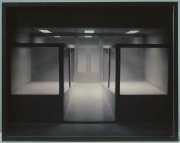Difference between revisions of "Plexiglass"
Jump to navigation
Jump to search
(username removed) |
m (Text replace - "== Authority ==" to "== Sources Checked for Data in Record ==") |
||
| Line 28: | Line 28: | ||
| − | == | + | == Sources Checked for Data in Record == |
* External source or communication Comment: Contribute information: H. James Harwood, Ph.D., Professor Emeritus of Polymer Science and Chemistry; The University of Akron, Akron Ohio, November 2007. | * External source or communication Comment: Contribute information: H. James Harwood, Ph.D., Professor Emeritus of Polymer Science and Chemistry; The University of Akron, Akron Ohio, November 2007. | ||
Revision as of 14:58, 1 May 2016
Description
A general name for a transparent, thermoplastic acrylic sheet. Plexiglass is composed of polymethyl methacrylate. It was invented, and the named was coined by, Otto Rohm and Walter Bauer of Rohm and Haas in Darmstadt Germany. It was developed by 1928 and first patented in 1933. The polymer was sold in Britain by the name of Perspex and in the U.S. as Plexiglas®. It is used for safety glass, signs, lens, windows, and furniture.
Synonyms and Related Terms
acrylic glass; Perspex; Plexiglas®; Altuglas, Polycast; Lucite®
| CAS | 9011-14-7 |
|---|---|
| Density | 1.19 |
| Refractive Index | 1.60 |
Additional Images
Sources Checked for Data in Record
- External source or communication Comment: Contribute information: H. James Harwood, Ph.D., Professor Emeritus of Polymer Science and Chemistry; The University of Akron, Akron Ohio, November 2007.
- Theodore J. Reinhart, Engineered Materials Handbook, Vol. 2: Engineered Plastics, ASM International, 1988
- G.S.Brady, Materials Handbook, McGraw-Hill Book Co., New York, 1971


